Organizational Behavior at BBC: Culture, Motivation, and Teams
VerifiedAdded on 2020/10/23
|14
|4309
|307
Report
AI Summary
This report analyzes organizational behavior within the context of the British Broadcasting Corporation (BBC). It explores the impact of culture, politics, and power on employee behavior, examining how these factors influence individual and team performance. The report delves into Handy's typology of organizational culture, French and Raven's power types, and the negative effects of managerial political behavior. It also discusses content and process theories of motivation, including Maslow's hierarchy of needs and Vroom's expectancy theory, to understand how to effectively motivate employees and achieve organizational goals. Furthermore, the report differentiates between effective and ineffective teams, highlighting the characteristics that contribute to successful teamwork. Finally, it covers the concepts and philosophies of organizational behavior to foster a positive work environment within the BBC. The report aims to provide a comprehensive overview of organizational behavior principles and their practical application within a real-world organizational setting.
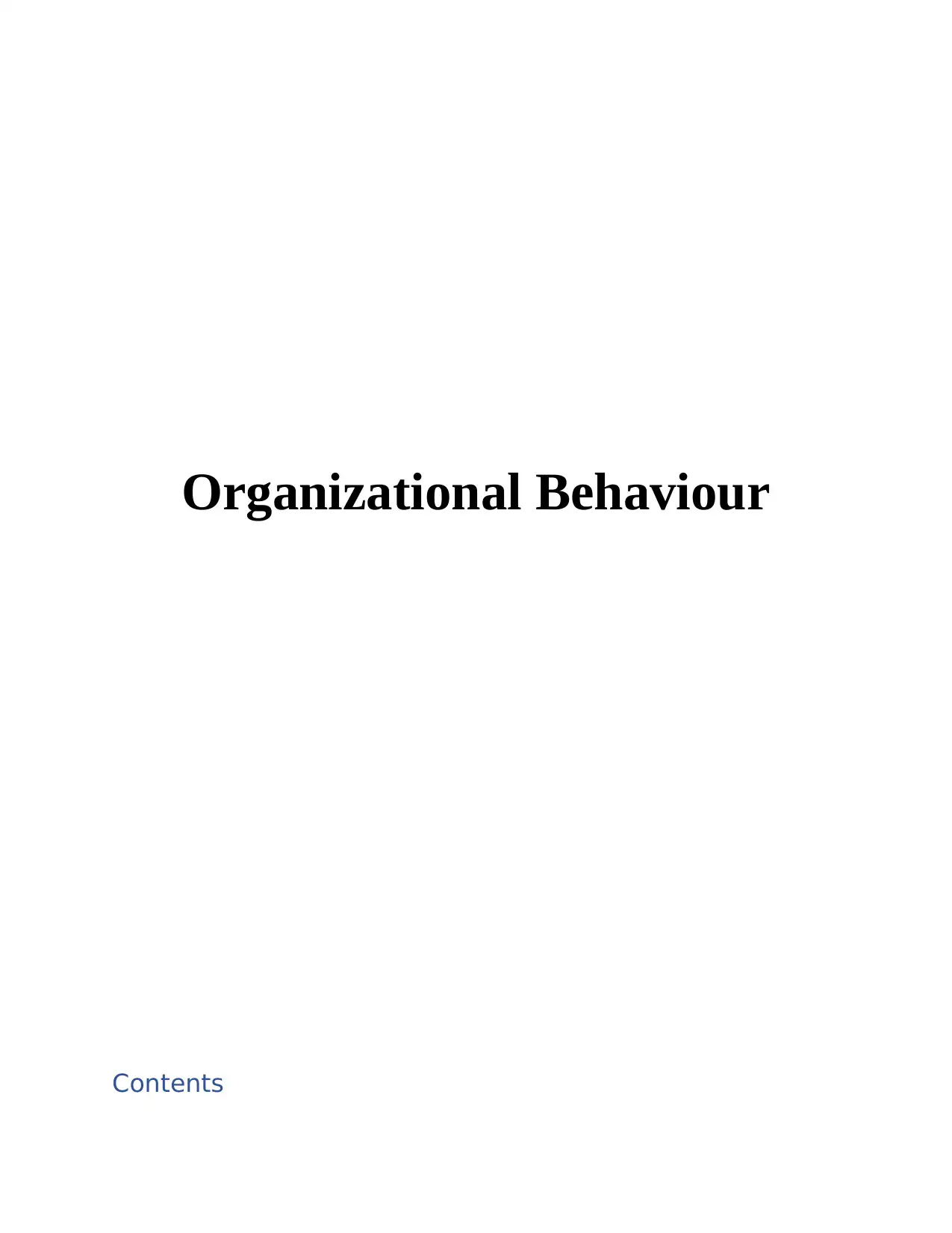
Organizational Behaviour
Contents
Contents
Paraphrase This Document
Need a fresh take? Get an instant paraphrase of this document with our AI Paraphraser
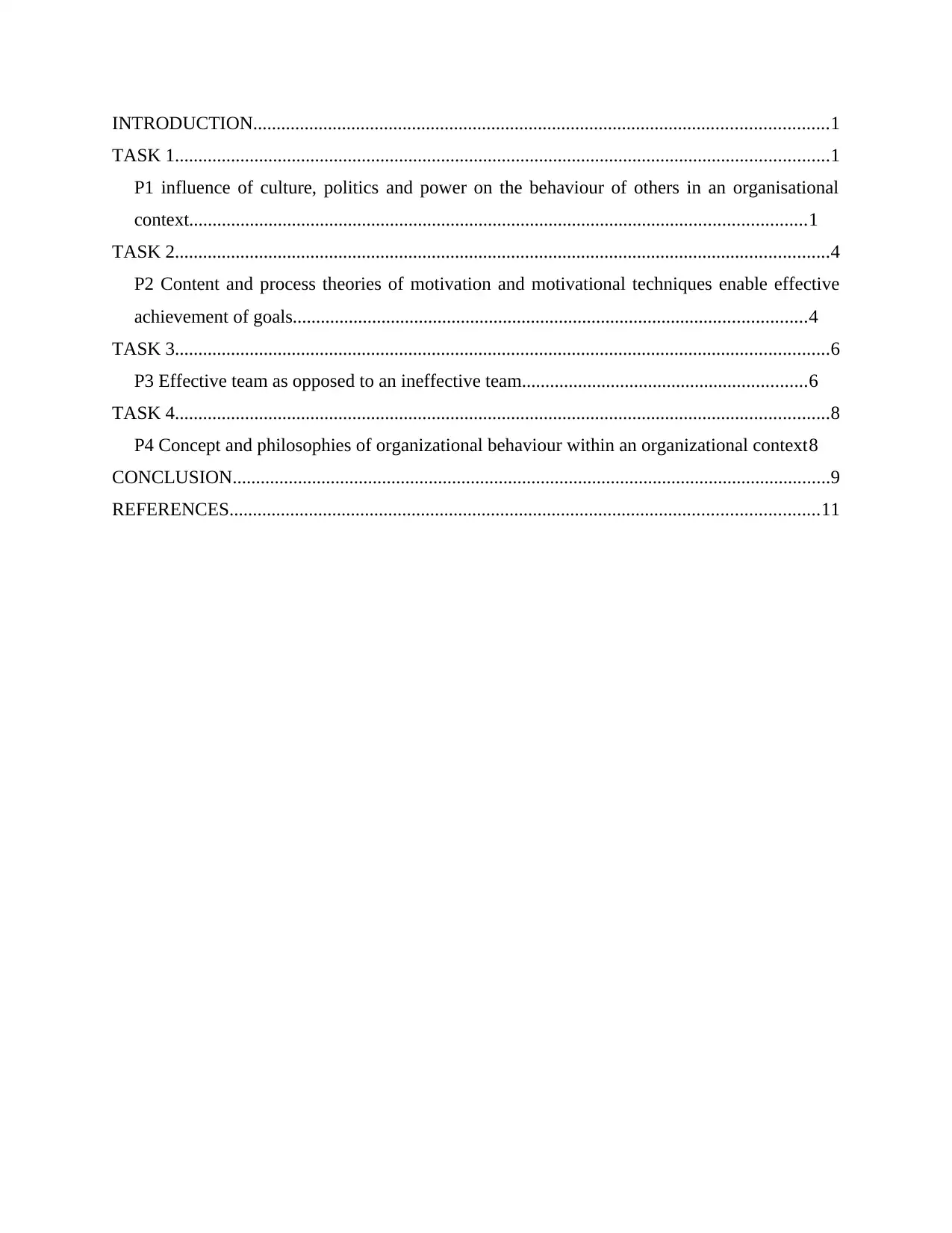
INTRODUCTION...........................................................................................................................1
TASK 1............................................................................................................................................1
P1 influence of culture, politics and power on the behaviour of others in an organisational
context....................................................................................................................................1
TASK 2............................................................................................................................................4
P2 Content and process theories of motivation and motivational techniques enable effective
achievement of goals..............................................................................................................4
TASK 3............................................................................................................................................6
P3 Effective team as opposed to an ineffective team.............................................................6
TASK 4............................................................................................................................................8
P4 Concept and philosophies of organizational behaviour within an organizational context8
CONCLUSION................................................................................................................................9
REFERENCES..............................................................................................................................11
TASK 1............................................................................................................................................1
P1 influence of culture, politics and power on the behaviour of others in an organisational
context....................................................................................................................................1
TASK 2............................................................................................................................................4
P2 Content and process theories of motivation and motivational techniques enable effective
achievement of goals..............................................................................................................4
TASK 3............................................................................................................................................6
P3 Effective team as opposed to an ineffective team.............................................................6
TASK 4............................................................................................................................................8
P4 Concept and philosophies of organizational behaviour within an organizational context8
CONCLUSION................................................................................................................................9
REFERENCES..............................................................................................................................11
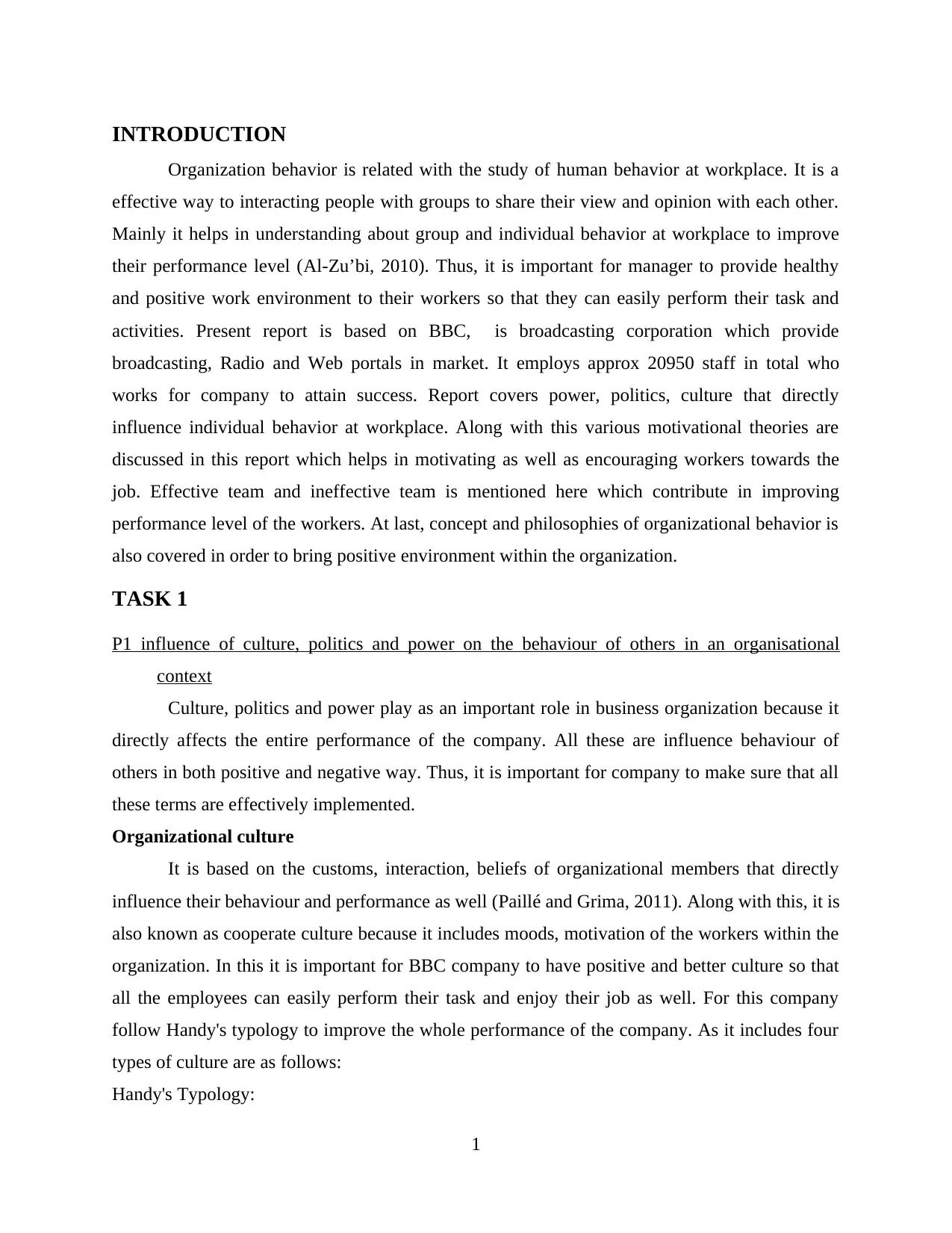
INTRODUCTION
Organization behavior is related with the study of human behavior at workplace. It is a
effective way to interacting people with groups to share their view and opinion with each other.
Mainly it helps in understanding about group and individual behavior at workplace to improve
their performance level (Al-Zu’bi, 2010). Thus, it is important for manager to provide healthy
and positive work environment to their workers so that they can easily perform their task and
activities. Present report is based on BBC, is broadcasting corporation which provide
broadcasting, Radio and Web portals in market. It employs approx 20950 staff in total who
works for company to attain success. Report covers power, politics, culture that directly
influence individual behavior at workplace. Along with this various motivational theories are
discussed in this report which helps in motivating as well as encouraging workers towards the
job. Effective team and ineffective team is mentioned here which contribute in improving
performance level of the workers. At last, concept and philosophies of organizational behavior is
also covered in order to bring positive environment within the organization.
TASK 1
P1 influence of culture, politics and power on the behaviour of others in an organisational
context
Culture, politics and power play as an important role in business organization because it
directly affects the entire performance of the company. All these are influence behaviour of
others in both positive and negative way. Thus, it is important for company to make sure that all
these terms are effectively implemented.
Organizational culture
It is based on the customs, interaction, beliefs of organizational members that directly
influence their behaviour and performance as well (Paillé and Grima, 2011). Along with this, it is
also known as cooperate culture because it includes moods, motivation of the workers within the
organization. In this it is important for BBC company to have positive and better culture so that
all the employees can easily perform their task and enjoy their job as well. For this company
follow Handy's typology to improve the whole performance of the company. As it includes four
types of culture are as follows:
Handy's Typology:
1
Organization behavior is related with the study of human behavior at workplace. It is a
effective way to interacting people with groups to share their view and opinion with each other.
Mainly it helps in understanding about group and individual behavior at workplace to improve
their performance level (Al-Zu’bi, 2010). Thus, it is important for manager to provide healthy
and positive work environment to their workers so that they can easily perform their task and
activities. Present report is based on BBC, is broadcasting corporation which provide
broadcasting, Radio and Web portals in market. It employs approx 20950 staff in total who
works for company to attain success. Report covers power, politics, culture that directly
influence individual behavior at workplace. Along with this various motivational theories are
discussed in this report which helps in motivating as well as encouraging workers towards the
job. Effective team and ineffective team is mentioned here which contribute in improving
performance level of the workers. At last, concept and philosophies of organizational behavior is
also covered in order to bring positive environment within the organization.
TASK 1
P1 influence of culture, politics and power on the behaviour of others in an organisational
context
Culture, politics and power play as an important role in business organization because it
directly affects the entire performance of the company. All these are influence behaviour of
others in both positive and negative way. Thus, it is important for company to make sure that all
these terms are effectively implemented.
Organizational culture
It is based on the customs, interaction, beliefs of organizational members that directly
influence their behaviour and performance as well (Paillé and Grima, 2011). Along with this, it is
also known as cooperate culture because it includes moods, motivation of the workers within the
organization. In this it is important for BBC company to have positive and better culture so that
all the employees can easily perform their task and enjoy their job as well. For this company
follow Handy's typology to improve the whole performance of the company. As it includes four
types of culture are as follows:
Handy's Typology:
1
⊘ This is a preview!⊘
Do you want full access?
Subscribe today to unlock all pages.

Trusted by 1+ million students worldwide
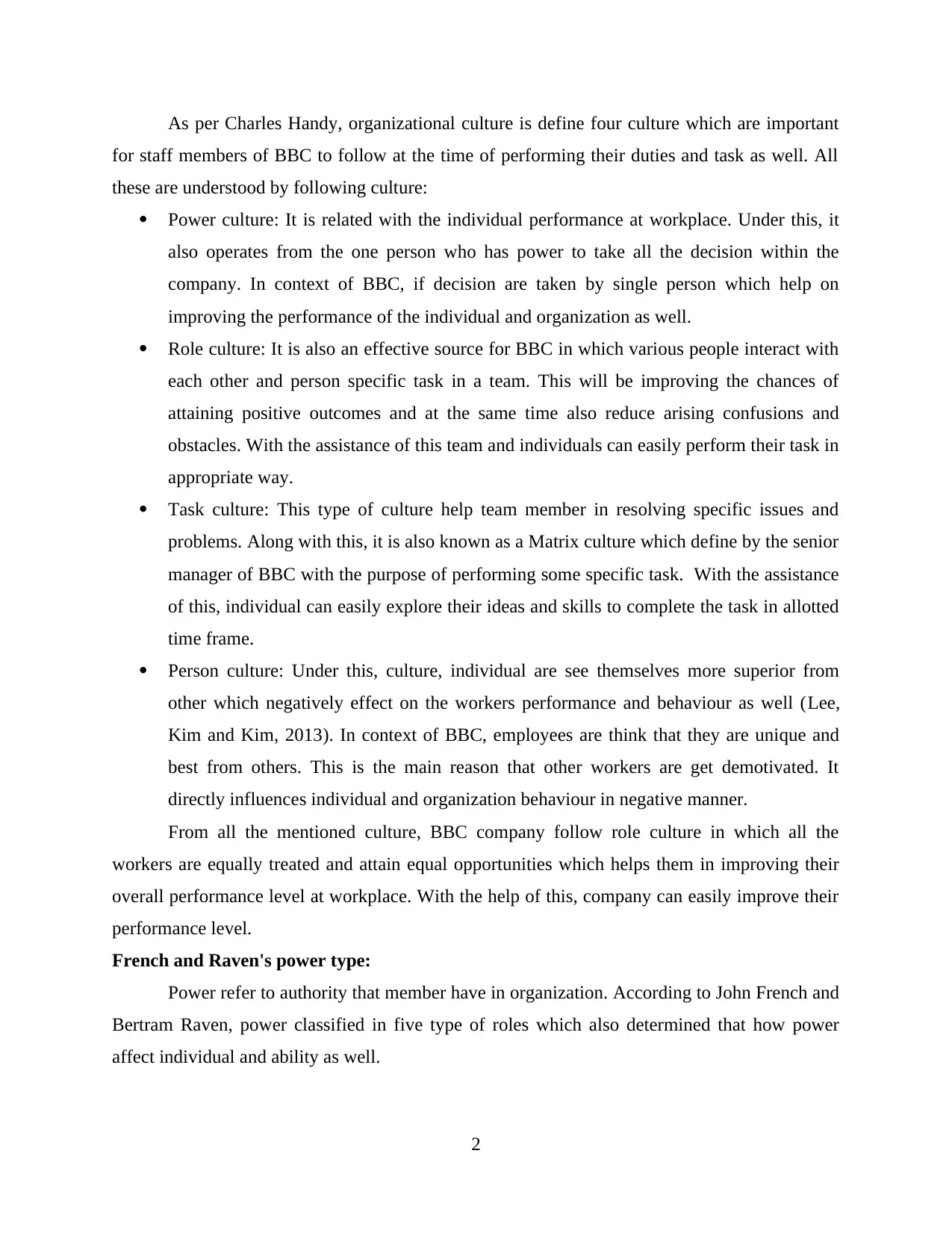
As per Charles Handy, organizational culture is define four culture which are important
for staff members of BBC to follow at the time of performing their duties and task as well. All
these are understood by following culture:
Power culture: It is related with the individual performance at workplace. Under this, it
also operates from the one person who has power to take all the decision within the
company. In context of BBC, if decision are taken by single person which help on
improving the performance of the individual and organization as well.
Role culture: It is also an effective source for BBC in which various people interact with
each other and person specific task in a team. This will be improving the chances of
attaining positive outcomes and at the same time also reduce arising confusions and
obstacles. With the assistance of this team and individuals can easily perform their task in
appropriate way.
Task culture: This type of culture help team member in resolving specific issues and
problems. Along with this, it is also known as a Matrix culture which define by the senior
manager of BBC with the purpose of performing some specific task. With the assistance
of this, individual can easily explore their ideas and skills to complete the task in allotted
time frame.
Person culture: Under this, culture, individual are see themselves more superior from
other which negatively effect on the workers performance and behaviour as well (Lee,
Kim and Kim, 2013). In context of BBC, employees are think that they are unique and
best from others. This is the main reason that other workers are get demotivated. It
directly influences individual and organization behaviour in negative manner.
From all the mentioned culture, BBC company follow role culture in which all the
workers are equally treated and attain equal opportunities which helps them in improving their
overall performance level at workplace. With the help of this, company can easily improve their
performance level.
French and Raven's power type:
Power refer to authority that member have in organization. According to John French and
Bertram Raven, power classified in five type of roles which also determined that how power
affect individual and ability as well.
2
for staff members of BBC to follow at the time of performing their duties and task as well. All
these are understood by following culture:
Power culture: It is related with the individual performance at workplace. Under this, it
also operates from the one person who has power to take all the decision within the
company. In context of BBC, if decision are taken by single person which help on
improving the performance of the individual and organization as well.
Role culture: It is also an effective source for BBC in which various people interact with
each other and person specific task in a team. This will be improving the chances of
attaining positive outcomes and at the same time also reduce arising confusions and
obstacles. With the assistance of this team and individuals can easily perform their task in
appropriate way.
Task culture: This type of culture help team member in resolving specific issues and
problems. Along with this, it is also known as a Matrix culture which define by the senior
manager of BBC with the purpose of performing some specific task. With the assistance
of this, individual can easily explore their ideas and skills to complete the task in allotted
time frame.
Person culture: Under this, culture, individual are see themselves more superior from
other which negatively effect on the workers performance and behaviour as well (Lee,
Kim and Kim, 2013). In context of BBC, employees are think that they are unique and
best from others. This is the main reason that other workers are get demotivated. It
directly influences individual and organization behaviour in negative manner.
From all the mentioned culture, BBC company follow role culture in which all the
workers are equally treated and attain equal opportunities which helps them in improving their
overall performance level at workplace. With the help of this, company can easily improve their
performance level.
French and Raven's power type:
Power refer to authority that member have in organization. According to John French and
Bertram Raven, power classified in five type of roles which also determined that how power
affect individual and ability as well.
2
Paraphrase This Document
Need a fresh take? Get an instant paraphrase of this document with our AI Paraphraser
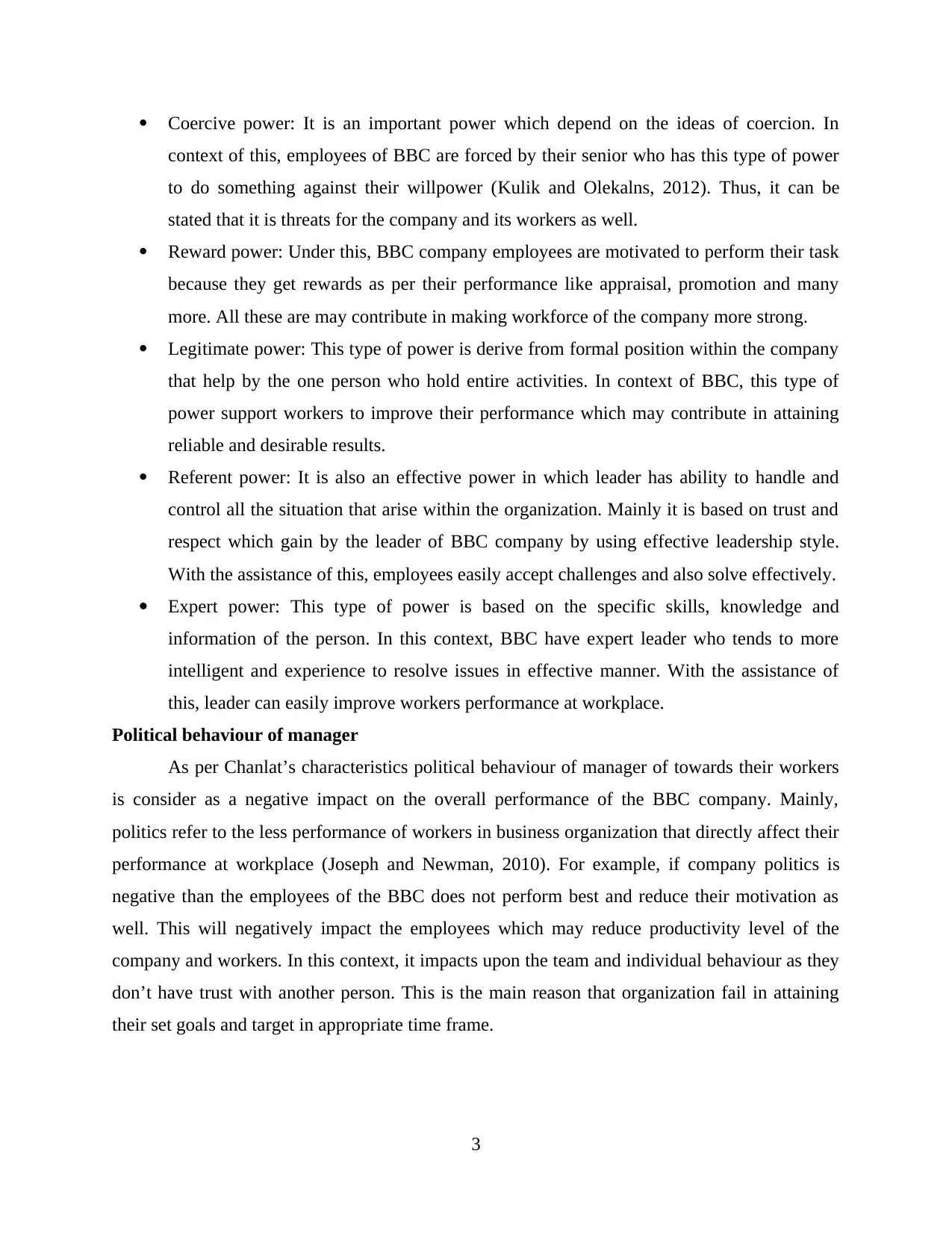
Coercive power: It is an important power which depend on the ideas of coercion. In
context of this, employees of BBC are forced by their senior who has this type of power
to do something against their willpower (Kulik and Olekalns, 2012). Thus, it can be
stated that it is threats for the company and its workers as well.
Reward power: Under this, BBC company employees are motivated to perform their task
because they get rewards as per their performance like appraisal, promotion and many
more. All these are may contribute in making workforce of the company more strong.
Legitimate power: This type of power is derive from formal position within the company
that help by the one person who hold entire activities. In context of BBC, this type of
power support workers to improve their performance which may contribute in attaining
reliable and desirable results.
Referent power: It is also an effective power in which leader has ability to handle and
control all the situation that arise within the organization. Mainly it is based on trust and
respect which gain by the leader of BBC company by using effective leadership style.
With the assistance of this, employees easily accept challenges and also solve effectively.
Expert power: This type of power is based on the specific skills, knowledge and
information of the person. In this context, BBC have expert leader who tends to more
intelligent and experience to resolve issues in effective manner. With the assistance of
this, leader can easily improve workers performance at workplace.
Political behaviour of manager
As per Chanlat’s characteristics political behaviour of manager of towards their workers
is consider as a negative impact on the overall performance of the BBC company. Mainly,
politics refer to the less performance of workers in business organization that directly affect their
performance at workplace (Joseph and Newman, 2010). For example, if company politics is
negative than the employees of the BBC does not perform best and reduce their motivation as
well. This will negatively impact the employees which may reduce productivity level of the
company and workers. In this context, it impacts upon the team and individual behaviour as they
don’t have trust with another person. This is the main reason that organization fail in attaining
their set goals and target in appropriate time frame.
3
context of this, employees of BBC are forced by their senior who has this type of power
to do something against their willpower (Kulik and Olekalns, 2012). Thus, it can be
stated that it is threats for the company and its workers as well.
Reward power: Under this, BBC company employees are motivated to perform their task
because they get rewards as per their performance like appraisal, promotion and many
more. All these are may contribute in making workforce of the company more strong.
Legitimate power: This type of power is derive from formal position within the company
that help by the one person who hold entire activities. In context of BBC, this type of
power support workers to improve their performance which may contribute in attaining
reliable and desirable results.
Referent power: It is also an effective power in which leader has ability to handle and
control all the situation that arise within the organization. Mainly it is based on trust and
respect which gain by the leader of BBC company by using effective leadership style.
With the assistance of this, employees easily accept challenges and also solve effectively.
Expert power: This type of power is based on the specific skills, knowledge and
information of the person. In this context, BBC have expert leader who tends to more
intelligent and experience to resolve issues in effective manner. With the assistance of
this, leader can easily improve workers performance at workplace.
Political behaviour of manager
As per Chanlat’s characteristics political behaviour of manager of towards their workers
is consider as a negative impact on the overall performance of the BBC company. Mainly,
politics refer to the less performance of workers in business organization that directly affect their
performance at workplace (Joseph and Newman, 2010). For example, if company politics is
negative than the employees of the BBC does not perform best and reduce their motivation as
well. This will negatively impact the employees which may reduce productivity level of the
company and workers. In this context, it impacts upon the team and individual behaviour as they
don’t have trust with another person. This is the main reason that organization fail in attaining
their set goals and target in appropriate time frame.
3
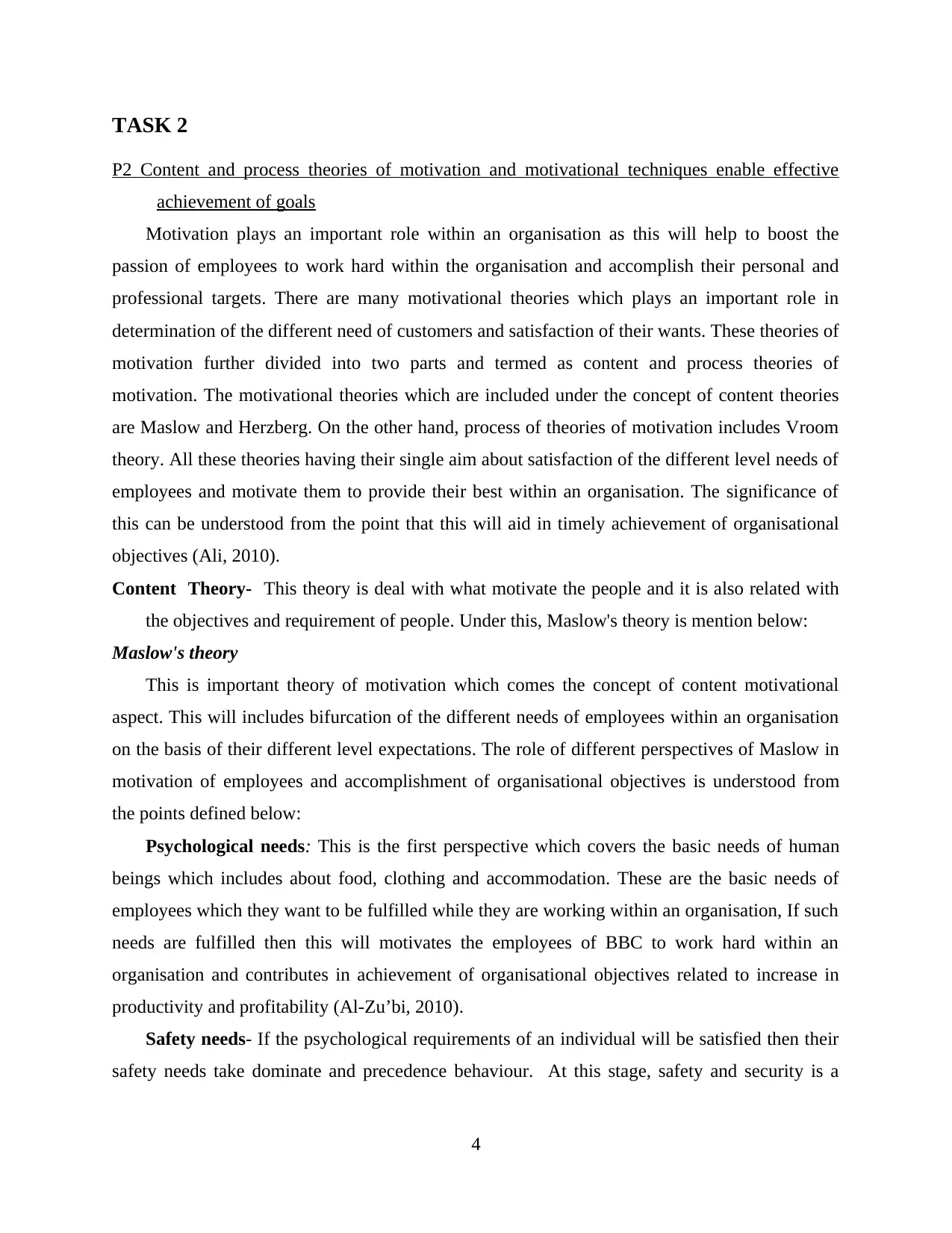
TASK 2
P2 Content and process theories of motivation and motivational techniques enable effective
achievement of goals
Motivation plays an important role within an organisation as this will help to boost the
passion of employees to work hard within the organisation and accomplish their personal and
professional targets. There are many motivational theories which plays an important role in
determination of the different need of customers and satisfaction of their wants. These theories of
motivation further divided into two parts and termed as content and process theories of
motivation. The motivational theories which are included under the concept of content theories
are Maslow and Herzberg. On the other hand, process of theories of motivation includes Vroom
theory. All these theories having their single aim about satisfaction of the different level needs of
employees and motivate them to provide their best within an organisation. The significance of
this can be understood from the point that this will aid in timely achievement of organisational
objectives (Ali, 2010).
Content Theory- This theory is deal with what motivate the people and it is also related with
the objectives and requirement of people. Under this, Maslow's theory is mention below:
Maslow's theory
This is important theory of motivation which comes the concept of content motivational
aspect. This will includes bifurcation of the different needs of employees within an organisation
on the basis of their different level expectations. The role of different perspectives of Maslow in
motivation of employees and accomplishment of organisational objectives is understood from
the points defined below:
Psychological needs: This is the first perspective which covers the basic needs of human
beings which includes about food, clothing and accommodation. These are the basic needs of
employees which they want to be fulfilled while they are working within an organisation, If such
needs are fulfilled then this will motivates the employees of BBC to work hard within an
organisation and contributes in achievement of organisational objectives related to increase in
productivity and profitability (Al-Zu’bi, 2010).
Safety needs- If the psychological requirements of an individual will be satisfied then their
safety needs take dominate and precedence behaviour. At this stage, safety and security is a
4
P2 Content and process theories of motivation and motivational techniques enable effective
achievement of goals
Motivation plays an important role within an organisation as this will help to boost the
passion of employees to work hard within the organisation and accomplish their personal and
professional targets. There are many motivational theories which plays an important role in
determination of the different need of customers and satisfaction of their wants. These theories of
motivation further divided into two parts and termed as content and process theories of
motivation. The motivational theories which are included under the concept of content theories
are Maslow and Herzberg. On the other hand, process of theories of motivation includes Vroom
theory. All these theories having their single aim about satisfaction of the different level needs of
employees and motivate them to provide their best within an organisation. The significance of
this can be understood from the point that this will aid in timely achievement of organisational
objectives (Ali, 2010).
Content Theory- This theory is deal with what motivate the people and it is also related with
the objectives and requirement of people. Under this, Maslow's theory is mention below:
Maslow's theory
This is important theory of motivation which comes the concept of content motivational
aspect. This will includes bifurcation of the different needs of employees within an organisation
on the basis of their different level expectations. The role of different perspectives of Maslow in
motivation of employees and accomplishment of organisational objectives is understood from
the points defined below:
Psychological needs: This is the first perspective which covers the basic needs of human
beings which includes about food, clothing and accommodation. These are the basic needs of
employees which they want to be fulfilled while they are working within an organisation, If such
needs are fulfilled then this will motivates the employees of BBC to work hard within an
organisation and contributes in achievement of organisational objectives related to increase in
productivity and profitability (Al-Zu’bi, 2010).
Safety needs- If the psychological requirements of an individual will be satisfied then their
safety needs take dominate and precedence behaviour. At this stage, safety and security is a
4
⊘ This is a preview!⊘
Do you want full access?
Subscribe today to unlock all pages.

Trusted by 1+ million students worldwide
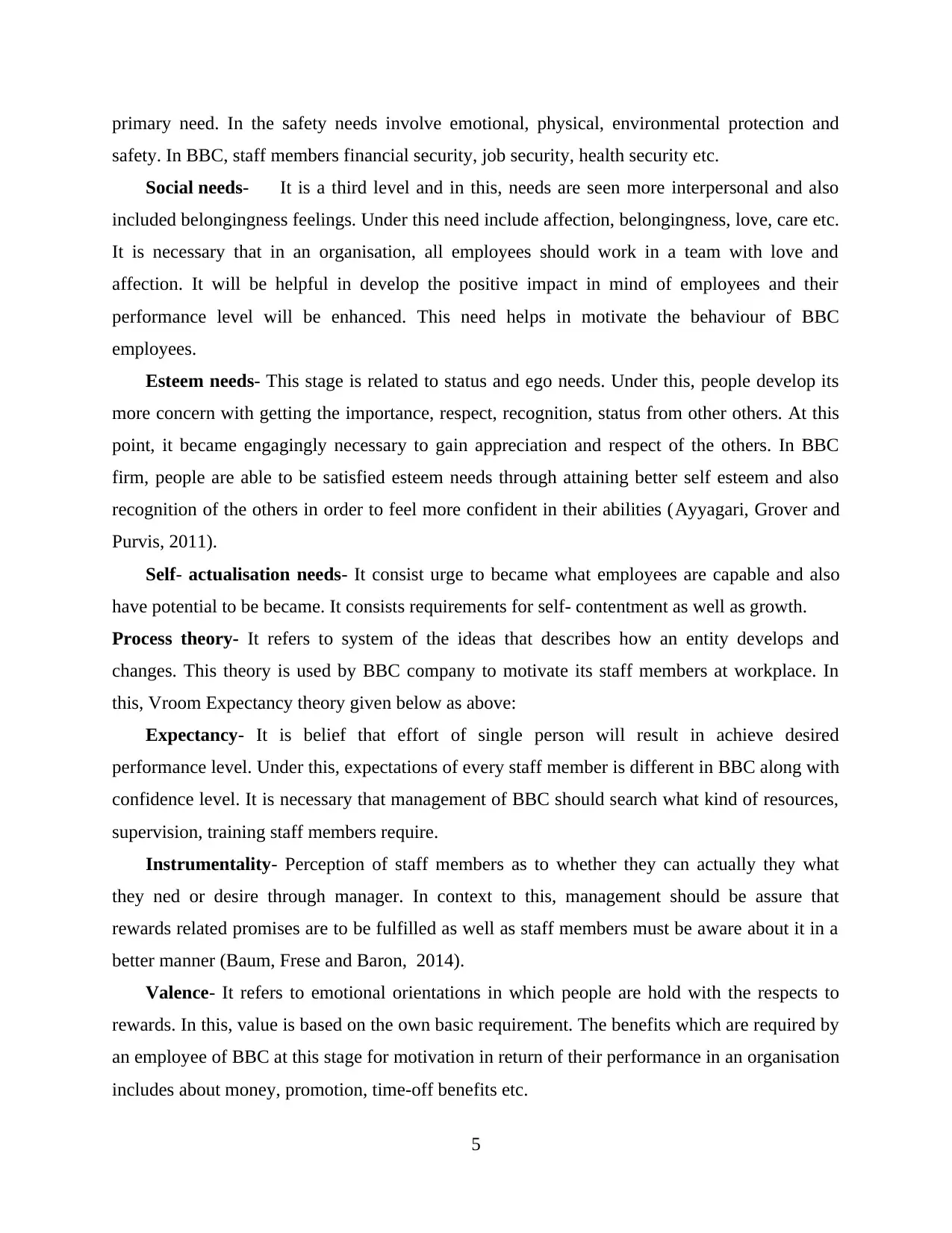
primary need. In the safety needs involve emotional, physical, environmental protection and
safety. In BBC, staff members financial security, job security, health security etc.
Social needs- It is a third level and in this, needs are seen more interpersonal and also
included belongingness feelings. Under this need include affection, belongingness, love, care etc.
It is necessary that in an organisation, all employees should work in a team with love and
affection. It will be helpful in develop the positive impact in mind of employees and their
performance level will be enhanced. This need helps in motivate the behaviour of BBC
employees.
Esteem needs- This stage is related to status and ego needs. Under this, people develop its
more concern with getting the importance, respect, recognition, status from other others. At this
point, it became engagingly necessary to gain appreciation and respect of the others. In BBC
firm, people are able to be satisfied esteem needs through attaining better self esteem and also
recognition of the others in order to feel more confident in their abilities (Ayyagari, Grover and
Purvis, 2011).
Self- actualisation needs- It consist urge to became what employees are capable and also
have potential to be became. It consists requirements for self- contentment as well as growth.
Process theory- It refers to system of the ideas that describes how an entity develops and
changes. This theory is used by BBC company to motivate its staff members at workplace. In
this, Vroom Expectancy theory given below as above:
Expectancy- It is belief that effort of single person will result in achieve desired
performance level. Under this, expectations of every staff member is different in BBC along with
confidence level. It is necessary that management of BBC should search what kind of resources,
supervision, training staff members require.
Instrumentality- Perception of staff members as to whether they can actually they what
they ned or desire through manager. In context to this, management should be assure that
rewards related promises are to be fulfilled as well as staff members must be aware about it in a
better manner (Baum, Frese and Baron, 2014).
Valence- It refers to emotional orientations in which people are hold with the respects to
rewards. In this, value is based on the own basic requirement. The benefits which are required by
an employee of BBC at this stage for motivation in return of their performance in an organisation
includes about money, promotion, time-off benefits etc.
5
safety. In BBC, staff members financial security, job security, health security etc.
Social needs- It is a third level and in this, needs are seen more interpersonal and also
included belongingness feelings. Under this need include affection, belongingness, love, care etc.
It is necessary that in an organisation, all employees should work in a team with love and
affection. It will be helpful in develop the positive impact in mind of employees and their
performance level will be enhanced. This need helps in motivate the behaviour of BBC
employees.
Esteem needs- This stage is related to status and ego needs. Under this, people develop its
more concern with getting the importance, respect, recognition, status from other others. At this
point, it became engagingly necessary to gain appreciation and respect of the others. In BBC
firm, people are able to be satisfied esteem needs through attaining better self esteem and also
recognition of the others in order to feel more confident in their abilities (Ayyagari, Grover and
Purvis, 2011).
Self- actualisation needs- It consist urge to became what employees are capable and also
have potential to be became. It consists requirements for self- contentment as well as growth.
Process theory- It refers to system of the ideas that describes how an entity develops and
changes. This theory is used by BBC company to motivate its staff members at workplace. In
this, Vroom Expectancy theory given below as above:
Expectancy- It is belief that effort of single person will result in achieve desired
performance level. Under this, expectations of every staff member is different in BBC along with
confidence level. It is necessary that management of BBC should search what kind of resources,
supervision, training staff members require.
Instrumentality- Perception of staff members as to whether they can actually they what
they ned or desire through manager. In context to this, management should be assure that
rewards related promises are to be fulfilled as well as staff members must be aware about it in a
better manner (Baum, Frese and Baron, 2014).
Valence- It refers to emotional orientations in which people are hold with the respects to
rewards. In this, value is based on the own basic requirement. The benefits which are required by
an employee of BBC at this stage for motivation in return of their performance in an organisation
includes about money, promotion, time-off benefits etc.
5
Paraphrase This Document
Need a fresh take? Get an instant paraphrase of this document with our AI Paraphraser
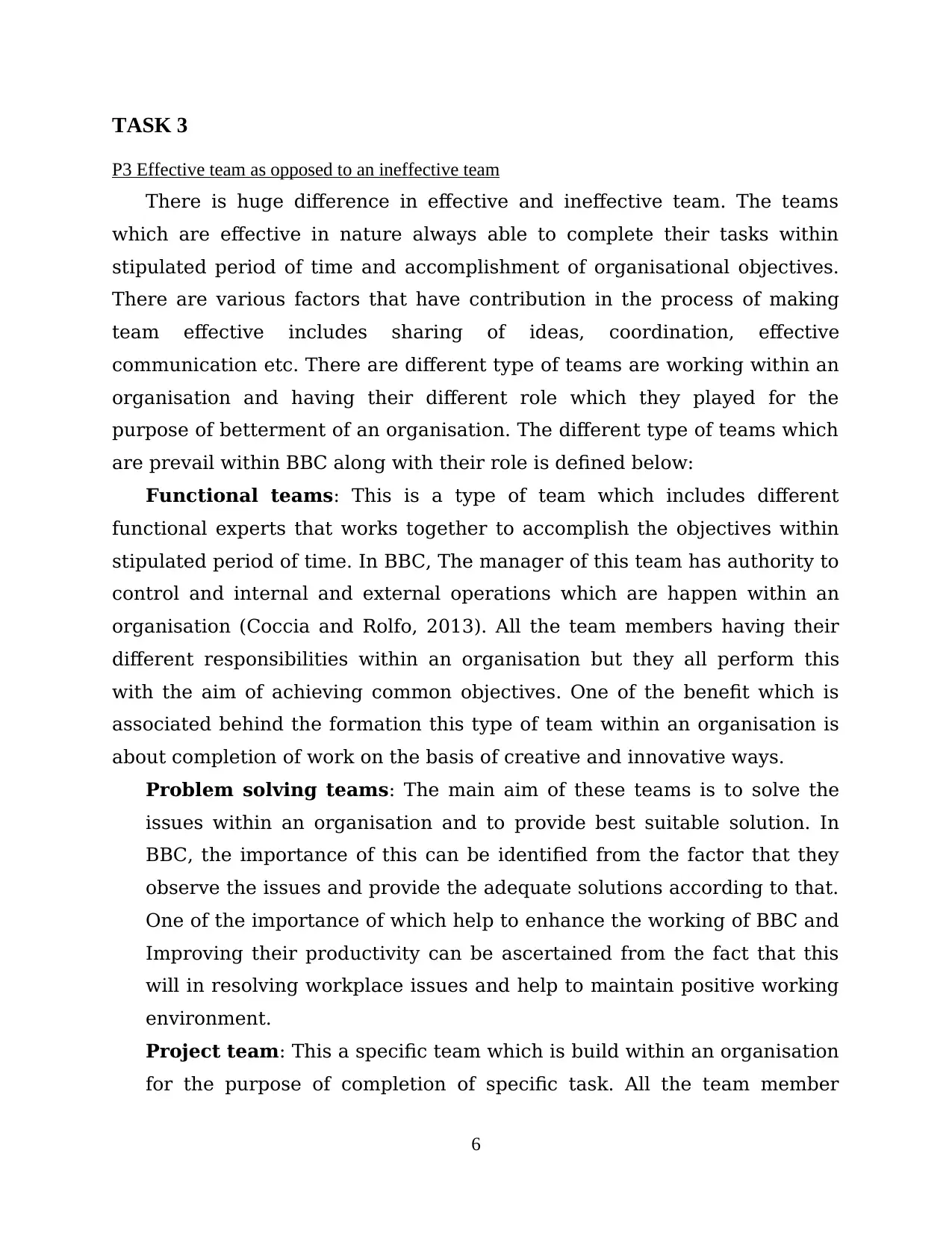
TASK 3
P3 Effective team as opposed to an ineffective team
There is huge difference in effective and ineffective team. The teams
which are effective in nature always able to complete their tasks within
stipulated period of time and accomplishment of organisational objectives.
There are various factors that have contribution in the process of making
team effective includes sharing of ideas, coordination, effective
communication etc. There are different type of teams are working within an
organisation and having their different role which they played for the
purpose of betterment of an organisation. The different type of teams which
are prevail within BBC along with their role is defined below:
Functional teams: This is a type of team which includes different
functional experts that works together to accomplish the objectives within
stipulated period of time. In BBC, The manager of this team has authority to
control and internal and external operations which are happen within an
organisation (Coccia and Rolfo, 2013). All the team members having their
different responsibilities within an organisation but they all perform this
with the aim of achieving common objectives. One of the benefit which is
associated behind the formation this type of team within an organisation is
about completion of work on the basis of creative and innovative ways.
Problem solving teams: The main aim of these teams is to solve the
issues within an organisation and to provide best suitable solution. In
BBC, the importance of this can be identified from the factor that they
observe the issues and provide the adequate solutions according to that.
One of the importance of which help to enhance the working of BBC and
Improving their productivity can be ascertained from the fact that this
will in resolving workplace issues and help to maintain positive working
environment.
Project team: This a specific team which is build within an organisation
for the purpose of completion of specific task. All the team member
6
P3 Effective team as opposed to an ineffective team
There is huge difference in effective and ineffective team. The teams
which are effective in nature always able to complete their tasks within
stipulated period of time and accomplishment of organisational objectives.
There are various factors that have contribution in the process of making
team effective includes sharing of ideas, coordination, effective
communication etc. There are different type of teams are working within an
organisation and having their different role which they played for the
purpose of betterment of an organisation. The different type of teams which
are prevail within BBC along with their role is defined below:
Functional teams: This is a type of team which includes different
functional experts that works together to accomplish the objectives within
stipulated period of time. In BBC, The manager of this team has authority to
control and internal and external operations which are happen within an
organisation (Coccia and Rolfo, 2013). All the team members having their
different responsibilities within an organisation but they all perform this
with the aim of achieving common objectives. One of the benefit which is
associated behind the formation this type of team within an organisation is
about completion of work on the basis of creative and innovative ways.
Problem solving teams: The main aim of these teams is to solve the
issues within an organisation and to provide best suitable solution. In
BBC, the importance of this can be identified from the factor that they
observe the issues and provide the adequate solutions according to that.
One of the importance of which help to enhance the working of BBC and
Improving their productivity can be ascertained from the fact that this
will in resolving workplace issues and help to maintain positive working
environment.
Project team: This a specific team which is build within an organisation
for the purpose of completion of specific task. All the team member
6
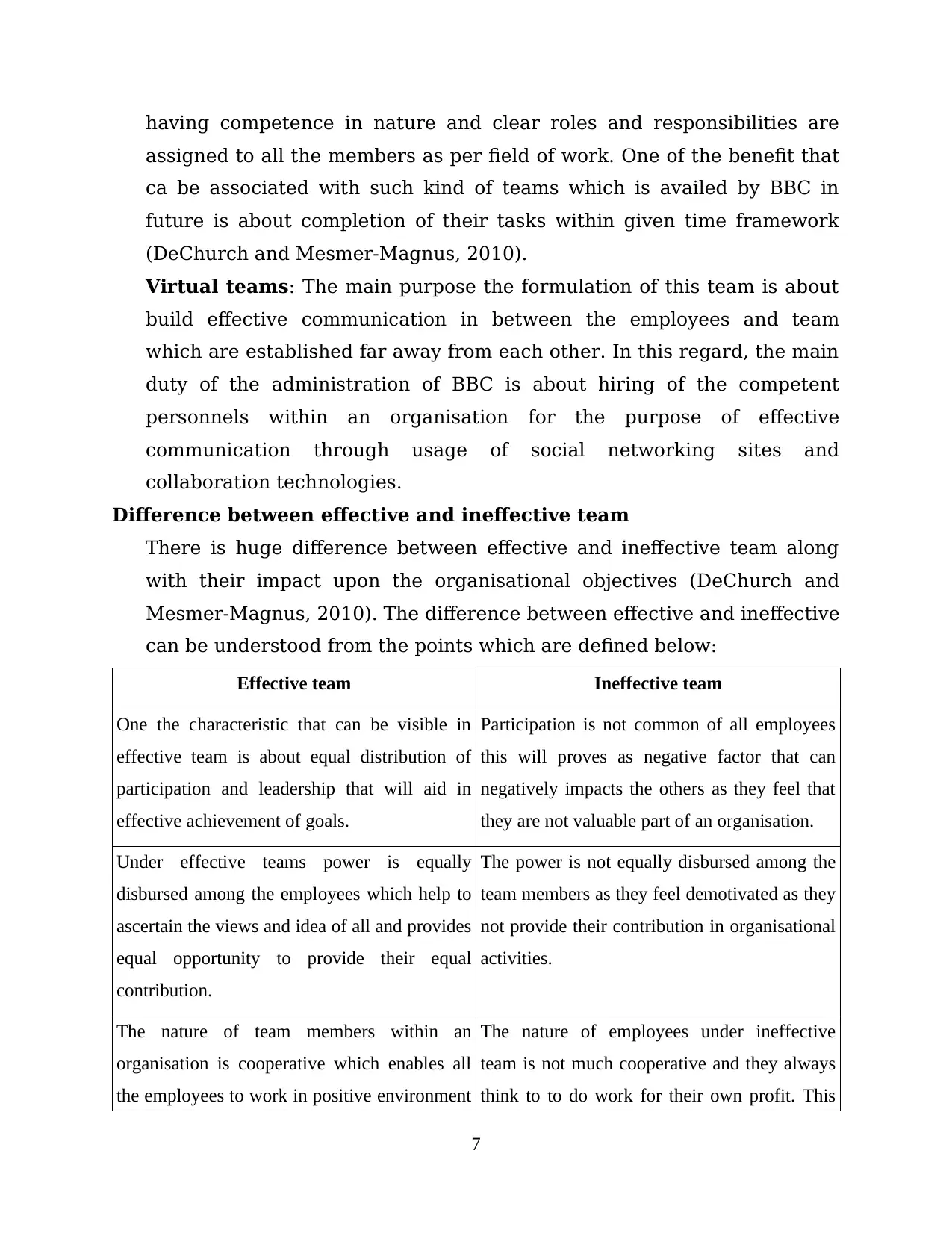
having competence in nature and clear roles and responsibilities are
assigned to all the members as per field of work. One of the benefit that
ca be associated with such kind of teams which is availed by BBC in
future is about completion of their tasks within given time framework
(DeChurch and Mesmer-Magnus, 2010).
Virtual teams: The main purpose the formulation of this team is about
build effective communication in between the employees and team
which are established far away from each other. In this regard, the main
duty of the administration of BBC is about hiring of the competent
personnels within an organisation for the purpose of effective
communication through usage of social networking sites and
collaboration technologies.
Difference between effective and ineffective team
There is huge difference between effective and ineffective team along
with their impact upon the organisational objectives (DeChurch and
Mesmer-Magnus, 2010). The difference between effective and ineffective
can be understood from the points which are defined below:
Effective team Ineffective team
One the characteristic that can be visible in
effective team is about equal distribution of
participation and leadership that will aid in
effective achievement of goals.
Participation is not common of all employees
this will proves as negative factor that can
negatively impacts the others as they feel that
they are not valuable part of an organisation.
Under effective teams power is equally
disbursed among the employees which help to
ascertain the views and idea of all and provides
equal opportunity to provide their equal
contribution.
The power is not equally disbursed among the
team members as they feel demotivated as they
not provide their contribution in organisational
activities.
The nature of team members within an
organisation is cooperative which enables all
the employees to work in positive environment
The nature of employees under ineffective
team is not much cooperative and they always
think to to do work for their own profit. This
7
assigned to all the members as per field of work. One of the benefit that
ca be associated with such kind of teams which is availed by BBC in
future is about completion of their tasks within given time framework
(DeChurch and Mesmer-Magnus, 2010).
Virtual teams: The main purpose the formulation of this team is about
build effective communication in between the employees and team
which are established far away from each other. In this regard, the main
duty of the administration of BBC is about hiring of the competent
personnels within an organisation for the purpose of effective
communication through usage of social networking sites and
collaboration technologies.
Difference between effective and ineffective team
There is huge difference between effective and ineffective team along
with their impact upon the organisational objectives (DeChurch and
Mesmer-Magnus, 2010). The difference between effective and ineffective
can be understood from the points which are defined below:
Effective team Ineffective team
One the characteristic that can be visible in
effective team is about equal distribution of
participation and leadership that will aid in
effective achievement of goals.
Participation is not common of all employees
this will proves as negative factor that can
negatively impacts the others as they feel that
they are not valuable part of an organisation.
Under effective teams power is equally
disbursed among the employees which help to
ascertain the views and idea of all and provides
equal opportunity to provide their equal
contribution.
The power is not equally disbursed among the
team members as they feel demotivated as they
not provide their contribution in organisational
activities.
The nature of team members within an
organisation is cooperative which enables all
the employees to work in positive environment
The nature of employees under ineffective
team is not much cooperative and they always
think to to do work for their own profit. This
7
⊘ This is a preview!⊘
Do you want full access?
Subscribe today to unlock all pages.

Trusted by 1+ million students worldwide
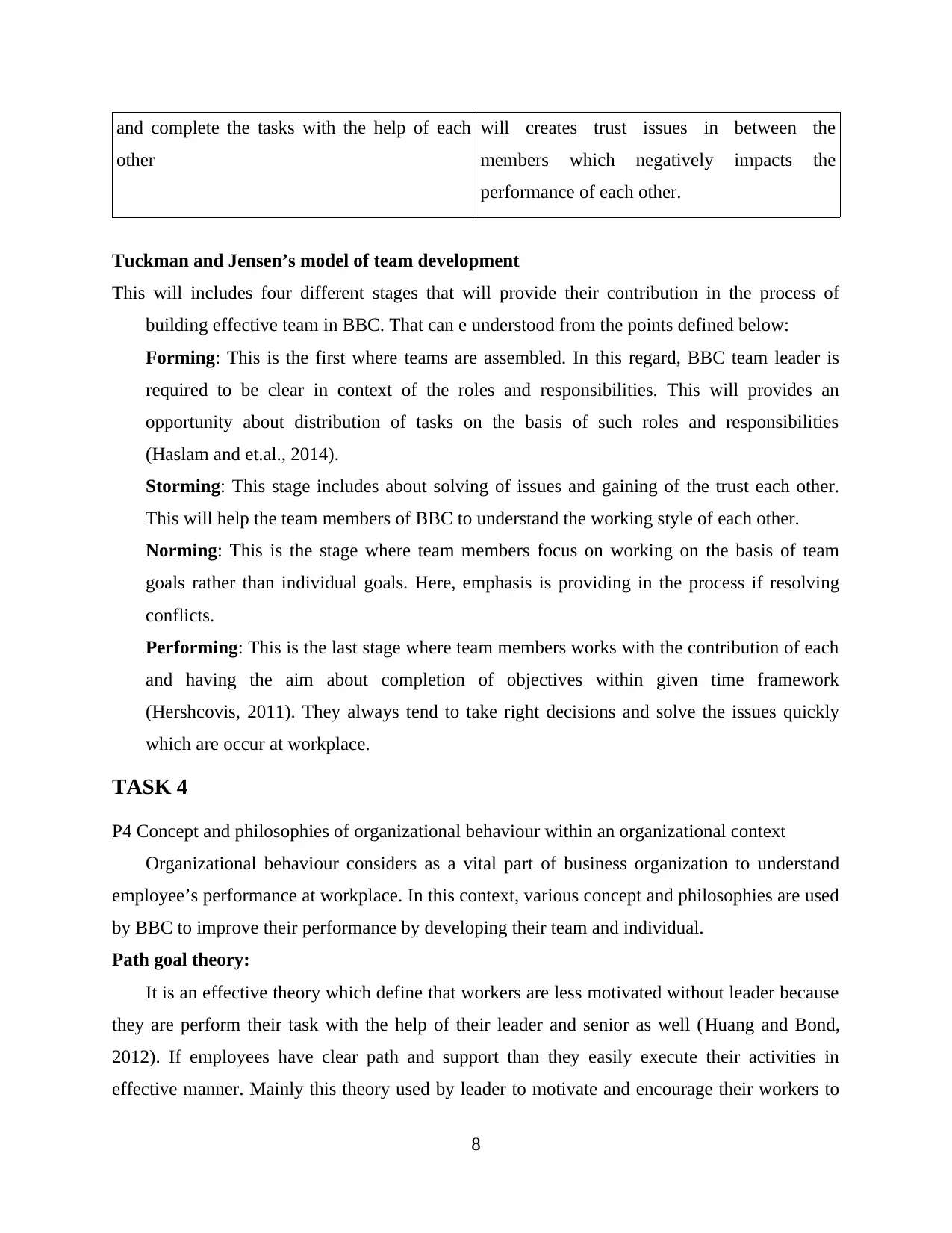
and complete the tasks with the help of each
other
will creates trust issues in between the
members which negatively impacts the
performance of each other.
Tuckman and Jensen’s model of team development
This will includes four different stages that will provide their contribution in the process of
building effective team in BBC. That can e understood from the points defined below:
Forming: This is the first where teams are assembled. In this regard, BBC team leader is
required to be clear in context of the roles and responsibilities. This will provides an
opportunity about distribution of tasks on the basis of such roles and responsibilities
(Haslam and et.al., 2014).
Storming: This stage includes about solving of issues and gaining of the trust each other.
This will help the team members of BBC to understand the working style of each other.
Norming: This is the stage where team members focus on working on the basis of team
goals rather than individual goals. Here, emphasis is providing in the process if resolving
conflicts.
Performing: This is the last stage where team members works with the contribution of each
and having the aim about completion of objectives within given time framework
(Hershcovis, 2011). They always tend to take right decisions and solve the issues quickly
which are occur at workplace.
TASK 4
P4 Concept and philosophies of organizational behaviour within an organizational context
Organizational behaviour considers as a vital part of business organization to understand
employee’s performance at workplace. In this context, various concept and philosophies are used
by BBC to improve their performance by developing their team and individual.
Path goal theory:
It is an effective theory which define that workers are less motivated without leader because
they are perform their task with the help of their leader and senior as well (Huang and Bond,
2012). If employees have clear path and support than they easily execute their activities in
effective manner. Mainly this theory used by leader to motivate and encourage their workers to
8
other
will creates trust issues in between the
members which negatively impacts the
performance of each other.
Tuckman and Jensen’s model of team development
This will includes four different stages that will provide their contribution in the process of
building effective team in BBC. That can e understood from the points defined below:
Forming: This is the first where teams are assembled. In this regard, BBC team leader is
required to be clear in context of the roles and responsibilities. This will provides an
opportunity about distribution of tasks on the basis of such roles and responsibilities
(Haslam and et.al., 2014).
Storming: This stage includes about solving of issues and gaining of the trust each other.
This will help the team members of BBC to understand the working style of each other.
Norming: This is the stage where team members focus on working on the basis of team
goals rather than individual goals. Here, emphasis is providing in the process if resolving
conflicts.
Performing: This is the last stage where team members works with the contribution of each
and having the aim about completion of objectives within given time framework
(Hershcovis, 2011). They always tend to take right decisions and solve the issues quickly
which are occur at workplace.
TASK 4
P4 Concept and philosophies of organizational behaviour within an organizational context
Organizational behaviour considers as a vital part of business organization to understand
employee’s performance at workplace. In this context, various concept and philosophies are used
by BBC to improve their performance by developing their team and individual.
Path goal theory:
It is an effective theory which define that workers are less motivated without leader because
they are perform their task with the help of their leader and senior as well (Huang and Bond,
2012). If employees have clear path and support than they easily execute their activities in
effective manner. Mainly this theory used by leader to motivate and encourage their workers to
8
Paraphrase This Document
Need a fresh take? Get an instant paraphrase of this document with our AI Paraphraser
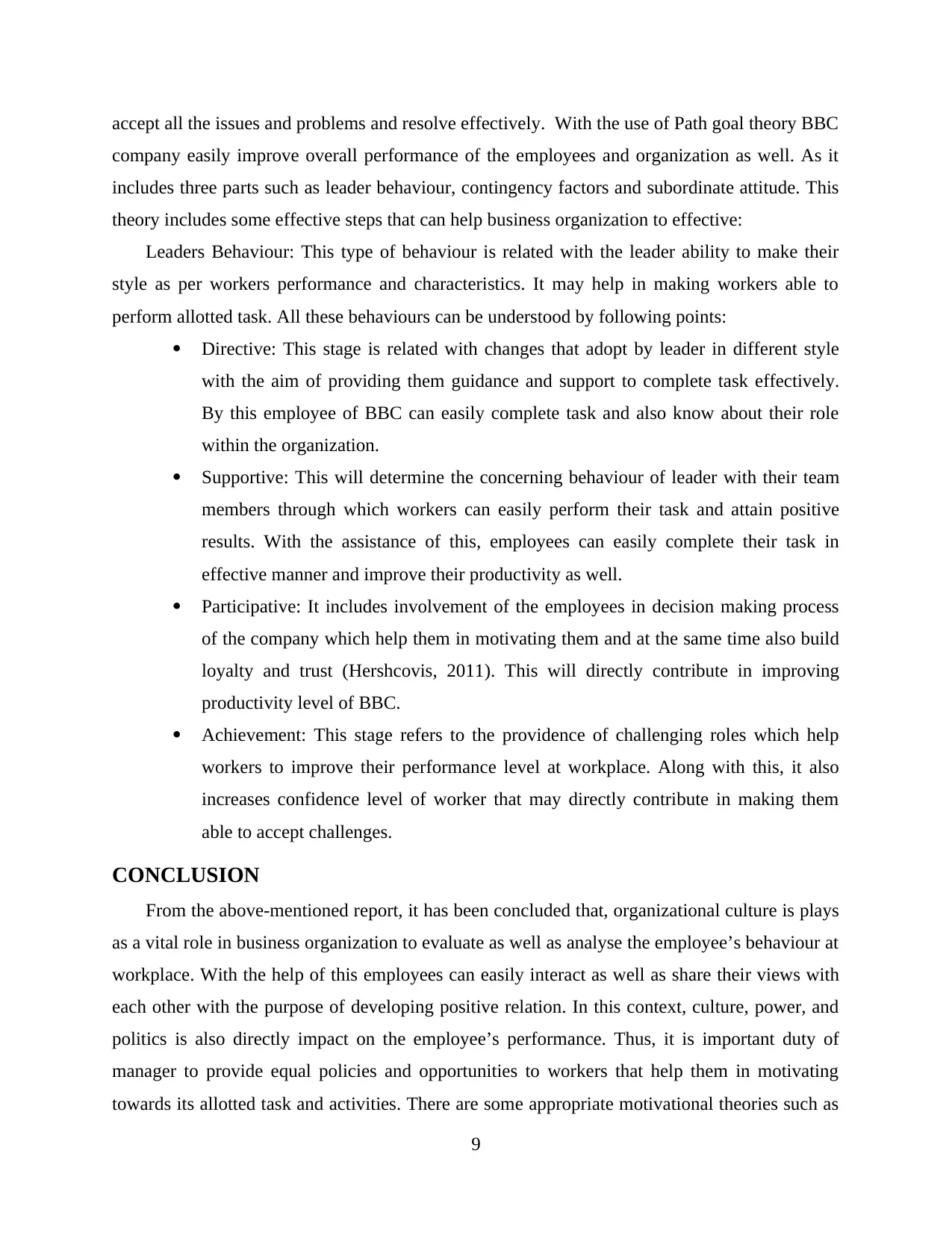
accept all the issues and problems and resolve effectively. With the use of Path goal theory BBC
company easily improve overall performance of the employees and organization as well. As it
includes three parts such as leader behaviour, contingency factors and subordinate attitude. This
theory includes some effective steps that can help business organization to effective:
Leaders Behaviour: This type of behaviour is related with the leader ability to make their
style as per workers performance and characteristics. It may help in making workers able to
perform allotted task. All these behaviours can be understood by following points:
Directive: This stage is related with changes that adopt by leader in different style
with the aim of providing them guidance and support to complete task effectively.
By this employee of BBC can easily complete task and also know about their role
within the organization.
Supportive: This will determine the concerning behaviour of leader with their team
members through which workers can easily perform their task and attain positive
results. With the assistance of this, employees can easily complete their task in
effective manner and improve their productivity as well.
Participative: It includes involvement of the employees in decision making process
of the company which help them in motivating them and at the same time also build
loyalty and trust (Hershcovis, 2011). This will directly contribute in improving
productivity level of BBC.
Achievement: This stage refers to the providence of challenging roles which help
workers to improve their performance level at workplace. Along with this, it also
increases confidence level of worker that may directly contribute in making them
able to accept challenges.
CONCLUSION
From the above-mentioned report, it has been concluded that, organizational culture is plays
as a vital role in business organization to evaluate as well as analyse the employee’s behaviour at
workplace. With the help of this employees can easily interact as well as share their views with
each other with the purpose of developing positive relation. In this context, culture, power, and
politics is also directly impact on the employee’s performance. Thus, it is important duty of
manager to provide equal policies and opportunities to workers that help them in motivating
towards its allotted task and activities. There are some appropriate motivational theories such as
9
company easily improve overall performance of the employees and organization as well. As it
includes three parts such as leader behaviour, contingency factors and subordinate attitude. This
theory includes some effective steps that can help business organization to effective:
Leaders Behaviour: This type of behaviour is related with the leader ability to make their
style as per workers performance and characteristics. It may help in making workers able to
perform allotted task. All these behaviours can be understood by following points:
Directive: This stage is related with changes that adopt by leader in different style
with the aim of providing them guidance and support to complete task effectively.
By this employee of BBC can easily complete task and also know about their role
within the organization.
Supportive: This will determine the concerning behaviour of leader with their team
members through which workers can easily perform their task and attain positive
results. With the assistance of this, employees can easily complete their task in
effective manner and improve their productivity as well.
Participative: It includes involvement of the employees in decision making process
of the company which help them in motivating them and at the same time also build
loyalty and trust (Hershcovis, 2011). This will directly contribute in improving
productivity level of BBC.
Achievement: This stage refers to the providence of challenging roles which help
workers to improve their performance level at workplace. Along with this, it also
increases confidence level of worker that may directly contribute in making them
able to accept challenges.
CONCLUSION
From the above-mentioned report, it has been concluded that, organizational culture is plays
as a vital role in business organization to evaluate as well as analyse the employee’s behaviour at
workplace. With the help of this employees can easily interact as well as share their views with
each other with the purpose of developing positive relation. In this context, culture, power, and
politics is also directly impact on the employee’s performance. Thus, it is important duty of
manager to provide equal policies and opportunities to workers that help them in motivating
towards its allotted task and activities. There are some appropriate motivational theories such as
9
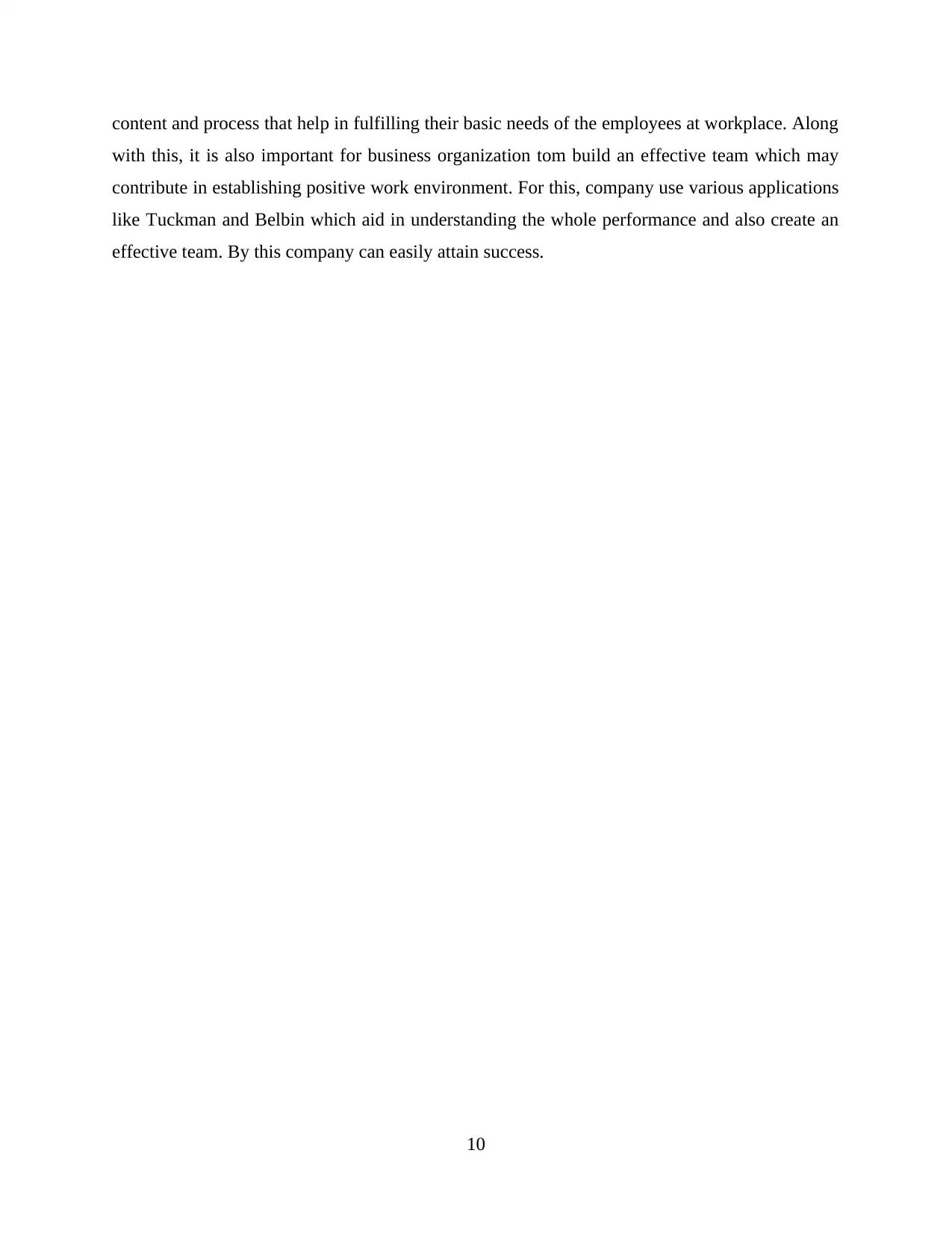
content and process that help in fulfilling their basic needs of the employees at workplace. Along
with this, it is also important for business organization tom build an effective team which may
contribute in establishing positive work environment. For this, company use various applications
like Tuckman and Belbin which aid in understanding the whole performance and also create an
effective team. By this company can easily attain success.
10
with this, it is also important for business organization tom build an effective team which may
contribute in establishing positive work environment. For this, company use various applications
like Tuckman and Belbin which aid in understanding the whole performance and also create an
effective team. By this company can easily attain success.
10
⊘ This is a preview!⊘
Do you want full access?
Subscribe today to unlock all pages.

Trusted by 1+ million students worldwide
1 out of 14
Related Documents
Your All-in-One AI-Powered Toolkit for Academic Success.
+13062052269
info@desklib.com
Available 24*7 on WhatsApp / Email
![[object Object]](/_next/static/media/star-bottom.7253800d.svg)
Unlock your academic potential
Copyright © 2020–2026 A2Z Services. All Rights Reserved. Developed and managed by ZUCOL.





